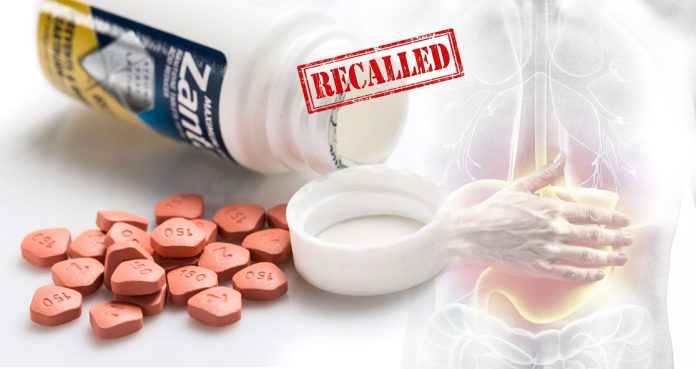The U.S. Food and Drug Administration (FDA) has announced new recalls to a list of popular heartburn medications, including generic Zantac because they were found to be tainted with a possible carcinogen, called N-Nitrosodimethylamine.
NDMA is an environmental contaminant found in foods and water. The World Health Organization (WHO) has classified NDMA as a “probable human carcinogen.”
NDMA contamination has already led to the recall of a variety of blood pressure medications, such as valsartan, losartan, and irbesartan.
The presence of NDMA in Zantac, as well as its generic versions, was first announced by the FDA in September.
The FDA announced a new recall on Thursday, which includes “all quantities and lots” of Zantac (ranitidine hydrochloride) 150 mg and 300 mg capsules manufactured by Appco Pharma with expiration dates of April/May 2021. It also includes “all unexpired lots,” in the same dosages, of ranitidine tablets manufactured by Northwind Pharmaceuticals.
So far, the companies have yet received any reports of adverse events related to the medications.
Zantac decreases the amount of acid secreted by the stomach. The medicine is available over-the-counter, which prevents and relieves heartburn caused by gastroesophageal reflux disease (GERD).
Responding to the current recalls, Gastroenterologist Dr. David Robbins at Lenox Hill Hospital, NY, said, “Drug impurities remain a major national concern. While Zantac may prove safe in the long run, this latest statement adds confusion and concern, so my interim advice to patients is simple: switch to another drug… and, of course, confirm with your doctor the need for an antacid.”
Meanwhile, scientists are conducting studies to understand why NDMA has been showing up in Zantac tablets.
Chemist Ron Najafi of Emery Lab told CBS News, “What we found out was that NDMA is being generated as a result of heating of ranitidine.”
He explained that NDMA levels in ranitidine tablets remain at around 25 nanograms at room temperature, which is under the threshold level of 96 nanograms that is considered unsafe.
However, NDMA levels increase in ranitidine tablets when heated at 158 degrees Fahrenheit, increasing to more than 140 nanograms.
Najafi said, “So if someone were to keep their ranitidine, Zantac, in their car, for example, and in the middle of summertime, that product is going to get heated up and it’s going to generate this compound. So NDMA in this case… is not an impurity in the drug, it’s being formed from the drug itself.”
Najafi explained that ranitidine tablets could be exposed to heat during the process of transportation. The Emery Lab has submitted its findings to the FDA, suggesting that medicines should be shipped under controlled measures and temperatures.
Director of the FDA’s Center for Drug Evaluation and Research Dr. Janet Woodcock said, “It does appear that some NDMA can form with significant heat.” “However, these are pretty high temperatures, so the question about whether ranitidine would need to be kept cold to keep it from converting is something that still hasn’t been answered,” she added.





















